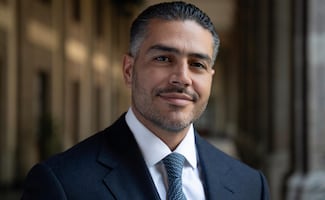Más Información

"Queremos cerrar este capítulo", dice Salinas Pliego al SAT; esperarán a enero a conocer fundamentos legales de adeudo fiscal

New York Times destaca rol de Harfuch en el combate del narco; resalta intercambio de inteligencia con EU

En operativo, cae secuestrador "El Chuleta" en Morelos; detienen a otros 38 generadores de violencia
Though the World Health Organization (WHO) removed homosexuality from its list of mental illnesses in 1990, fear and misinformation still dominate the cultural landscape in Mexico, triggering violence and discrimination against the LGBTQ community .
In an interview, Mexican producer Juan Osorio, who was recently given the Premio Mariposa award at the Mix: Cinema and Sexual Diversity festival , regretted that many Mexicans were still prejudiced and showed rejection towards the community.
Osorio is the executive producer of the telenovela “Mi marido tiene más familia,” a TV series that gave birth to the #Aristemo phenomenon: A relationship between two gay teenagers that constituted an unprecedented leap for Mexican television, known for its extreme prudishness and retrograde morality.
Surprisingly, the show was very well received among Mexican audiences and so Osorio decided to create a theater play based on the story of these two youngsters, with shows in Mexico City and other states.
However, during a tour, the show’s theatrical adaptation team and crew experienced some of the rejection that men and women from the LGBTQ community face every day in Mexico.
“With the theater play, I have felt some rejection towards Aristemo, and though I understand that a society such as ours (Mexico) may be more reluctant to accept this type of content, I feel like we are progressing little by little,” Osorio stated, reaffirming his commitment to continue supporting projects that promote the acceptance of the LGBTQ community, which is strongly stigmatized in Mexico.
San Luis Potosí
turned out to be a particularly homophobic state and very few people were able to attend the Aristemo theatrical piece, which is meant to promote sexual diversity.
“Many parents did not give their children permission to see the play and it has a lot to do with a discriminatory mindset,” the producer expressed.
However, he commented that they had seen a good response from audiences in cities such as Monterrey , even though it is known for being quite conservative. “There were places where we had a very good response from the audience, though we saw some rejection in others. It’s not so easy to open people’s minds, but it is important that they learn that the LGBTQ community deserves our acceptance and support,” he stated.
When speaking of the connection he felt with the community, Osorio expressed that he understood them very well because he had experienced discrimination and marginalization in his lifetime. “It is very hard to break apart from it and if there is anything I can do for them, I will do so wholeheartedly.”
Mexican actors Emilio Osorio and Joaquín Bondoni give life to Aristóteles Córcega and Cuauhtémoc López in the show.
In an interview, Emilio Osorio expressed his satisfaction in knowing that he has given a voice to minorities and showed gratitude toward Mexican audiences for accepting the teenage characters.
“It is a blessing and an honor that they have accepted us. We know that our fandom can be very zealous and the fact that they’re happy with our work is very satisfactory,” he claimed, though he preferred not to talk about the dire situation facing the LGBTQ community in Mexico.
“I don’t like talking about that because it arouses some strong emotions. Unfortunately, these things keep happening and they make me angry, but we have to keep fighting to promote diversity,” said the 16-year-old actor .
Last month, the show producer announced that a spin-off of the series “Mi Marido Tiene Familia” would be launched on June 24 . The new show will be called “El corazón nunca se equivoca” (The Heart is Never Wrong) and will be divided into 25 chapters telling the story of Aristóteles and Cuauhtémoc.
dm
Noticias según tus intereses
[Publicidad]
[Publicidad]












